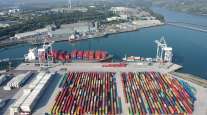Indiana Nonprofit Works to Improve State’s Logistic Network

Conexus Indiana staff members don't consider themselves lobbyists, but rather staff for the General Assembly "thinking through policy issues. We try to figure out what the state needs” to improve its work climate, said operations and business development Vice President David Holt. He spoke to members of the nonprofit Indiana DriveTrain at Southeastern Career Center Jan. 10.
"We make those things happen through the public or private sector."
The Hoosier nonprofit was formed in 2007 through the Central Indiana Corporate Partnership with initial funding from Lilly Endowment. CICP focused on advanced manufacturing, logistics, financial services, technology and life sciences — and wanted Conexus to do the same. Soon Holt was traveling statewide.
The push began when Bob Cook of Cook Manufacturing in Evansville established a four-county chambers of commerce and economic development group to create an area logistics strategic plan and asked the Indianapolis nonprofit to help.
Then Indiana officials requested that Holt do that around the state. He formed a Conexus Indiana Logistics Council, which is comprised of six regional groups. He invited CEOs, including Shorty Whittington, Batesville Airport owner, to help develop it. "What were the regional needs? It evolved further."
RELATED: Indiana senate GOP won't rule out gas tax hike to fund highways
A 2010 transportation strategic plan "looked at those things we needed to do in the next 10 years that absolutely are vital to Indiana’s competitiveness." The vice president listed a few of the projects: U.S. Route 30 limited access; Interstate 69 being finished 31 from Indianapolis to South Bend; and the Louisville bridge project.
Holt worked with the Indiana Department of Transportation on how much it would cost to upgrade roads in all 92 counties. The leader hired a consultant to meet with economic development and businesspeople around Indiana to help identify projects they needed and also workforce development initiatives.
INDOT estimated the cost for 30 years of projects so that the General Assembly has a dollar figure. Holt pointed out, "That came from the work that we did."
Eighteen of the 26 members on the Blue Ribbon Commission for Transportation Infrastructure came from groups he formed. The panel gave a final report to then-Gov. Mike Pence on July 9, 2014.
According to Holt, the state spends $670 million annually on roads, plus $200 million for maintenance, including snow removal. After deciding on future road projects, the Blue Ribbon panel concluded the state needs to spend around $800 million annually in addition to the $870 million earmarked now.
The vice president said, "In our opinion as a think tank, $1.4 billion is the minimum we need to be competitive by 2035."
He has ideas about where to get this extra money. "The gas tax hasn’t been raised since 2003."
Holt predicted Indiana House Speaker Brian Bosma will propose gas and diesel taxes to provide additional revenue. "More of the gas sales tax will go back to improve roads."
RELATED: Indiana lawmaker aims to raise speed limit for trucks
The proposal will be heard in the Indiana House of Representatives on Jan. 25. After it is amended, the bill will travel to the Senate. According to Holt, "This is going to be probably a four-month process. If you see letters to the editor saying we don’t need a gas tax [increase], respond to them, because we do."
Indiana leaders also are doing tolling studies. Turning I-65 into a toll road would generate $325 million a year. Holt noted more lanes could be added so there could be two for cars and two for trucks.
Getting drivers to pay tolls on I-70 would generate $300 million per year. Holt said, "When a truck gets off of the toll road in northern Indiana, he thinks he’s saving money. By stopping at every stoplight, it costs him more" in gasoline. "To explain that to a smaller trucker is very difficult."
Because INDOT would have to ask for a waiver, if passed, it would be at least 2021 before tolls would start. Holt felt that probably a private sector company would manage toll roads.
Decent roads are integral to the state's success, he believed. There are four things companies look at when considering relocation: roads, tax and regulation climates and workforce. Bad roads “will eventually stop companies from coming here.”
Ripley County economic development director Gary Norman asked who is included on the Southeast Indiana Logistics Council. Holt explained Matt Wirth of the Jefferson County Industrial Development Corp. represents local economic development organizations and One Southern Indiana represents chambers of commerce.
More members can be added, he said. The Batesville (formerly Batesville Casket) director of logistics will start attending and “Crum (Trucking, Batesville) probably should be involved. There are a lot of companies around the state.” But Holt hasn’t approached every one of them. Regional projects are constantly changing and persons can give input.
"We only focus on the movement of products,” not people, Holt said.
He commented, "The new [proposed southeast Indiana Ohio River] port still is being studied. If it does show the port is viable, it will be great for this area."
The state wants Conexus to study products being transported by truck, rail, water and air. The vice president is hoping to use university students to gather data so the study is not too expensive.
He summed up Conexus Indiana's contribution to the state's success this way: "We focus on one big thing at a time. We make that happen, then move on to the next."




